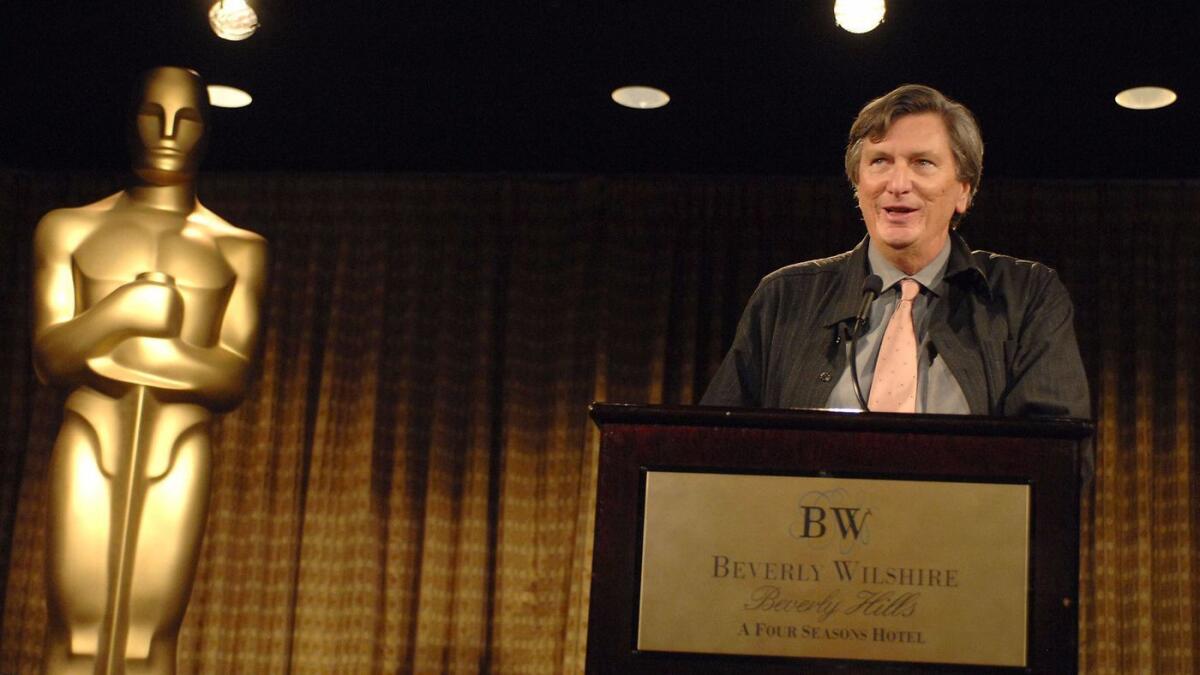Motion picture academy president John Bailey faces accusations of sexual harassment

John Bailey, who was elected in August as the 34th president of the Academy of Motion Picture Arts and Sciences, is being investigated by the organization following allegations of sexual harassment against him.
On Wednesday, three harassment claims were reportedly brought against the veteran cinematographer, whose credits include such films as “Ordinary People,” “The Big Chill,” and “Groundhog Day,” prompting the academy — which recently enacted new standards of conduct for its members — to open a probe.
“The Academy treats any complaints confidentially to protect all parties,” the group said in a statement released Friday afternoon. “The Membership Committee reviews all complaints brought against Academy members according to our Standards of Conduct process, and after completing reviews, reports to the Board of Governors. We will not comment further on such matters until the full review is completed.”
Variety first reported the news of the allegations. Bailey did not respond to a request for comment.
The latest in a string of public relations crises to hit the academy in recent years, the accusations against Bailey come as the group itself has been navigating the sexual misconduct scandals that have reverberated across the entertainment industry since the fall, sparking the Time’s Up movement that loomed large over this year’s awards season up to and including this month’s Oscar telecast.
In October, the board of governors of the 90-year-old institution — including such luminaries as Steven Spielberg, Kathleen Kennedy and Tom Hanks — voted to expel disgraced film mogul Harvey Weinstein from the group’s ranks following multiple charges of sexual harassment and assault against him.
Following that move, the 75-year-old Bailey wrote to members, “The Academy cannot, and will not, be an inquisitorial court but we can be part of a larger initiative to define standards of behavior, and to support the vulnerable women and men who may be at personal and career risk because of violations of ethical standards by their peers.”
In December, the academy adopted new standards of conduct that its members are expected to uphold, stating that the group is “categorically opposed to any form of abuse, harassment or discrimination on the basis of gender, sexual orientation, race, ethnicity, disability, age, religion, or nationality.”
According to procedures outlined to members in January, accusations of misconduct against members, if deemed credible, will ultimately be brought to the 54-member board of governors, which “may take any disciplinary action permitted by the Academy’s bylaws, including suspension or expulsion.”
Some within the organization, however, have wrestled in recent months with the implications of requiring the academy to police its members’ behavior. Other Hollywood figures who have become ensnared in sexual misconduct controversies — including Bill Cosby, Roman Polanski, Kevin Spacey and Brett Ratner — remain members of the group.
Bailey, previously a board member representing the cinematographers branch, was considered a surprise choice to succeed former president Cheryl Boone Isaacs, who had been the first African American to serve in the role.
Though the position of academy president is unpaid and has traditionally been largely ceremonial, in recent years, it has become more demanding and closely scrutinized. Upon his election to a four-year term, Bailey immediately inherited a series of challenges facing the organization, including a continuing push to diversify its overwhelmingly white and male membership ranks, an ambitious effort to build an academy museum in Los Angeles and the steady erosion in ratings for the Oscars telecast, which hit an all-time low this year.
Twitter: @joshrottenberg
More to Read
Only good movies
Get the Indie Focus newsletter, Mark Olsen's weekly guide to the world of cinema.
You may occasionally receive promotional content from the Los Angeles Times.











